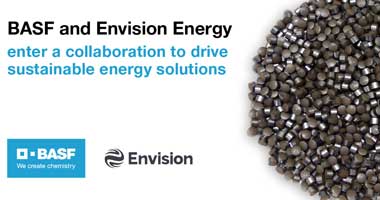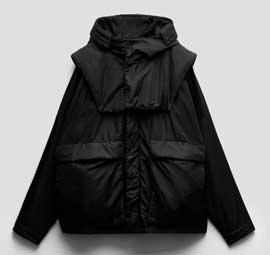Green tie-ups: BASF/Envision collaborate on e-methanol from green hydrogen in China; BASF/Inditex breakthrough in textile recycling with launch of recycled PA6

German chemical firm BASF’s process catalysts has announced a new collaboration with Envision Energy, a leading green technology provider of comprehensive net zero solutions. The collaboration aims to further develop the conversion of green hydrogen and CO2 into e-methanol through an advanced, dynamic process design.
Backed by their respective expertise, the two companies aim to optimise the process of producing e-methanol from green hydrogen and CO2, paving the way for a more sustainable energy landscape. This collaboration will see BASF provide its Synspire catalyst technology, which Envision Energy will integrate with its innovative energy management system.
The two organisations plan to demonstrate the viability of the advanced process design next year, at Envision Energy’s Chifeng site in Inner Mongolia, China.
The new catalyst developed by BASF represents a significant breakthrough in sustainable energy solutions. It enables the efficient conversion of green hydrogen and CO2 into e-methanol.
Methanol (or e-methanol when produced with renewable energy) is one of the most versatile and clean-burning fuels. E-methanol offers immense potential to replace fossil fuels and their derivatives gasoline and kerosene by providing an alternative source of energy for road, shipping and air transport, as well as other industries. Not only can e-methanol be used without a change in infrastructure, but its inherent stability also allows it to be stored at room temperature and ambient pressure, giving it an indefinite shelf life, thereby to reduce greenhouse gas emissions and promote a more sustainable energy ecosystem.
Envision Energy will design a process package that maximises the efficiency of the catalyst technology while fully enabling the dynamic conversion of green hydrogen and CO2 into e-methanol, in sync with the onstream time of wind power.
Envision Energy will leverage its pioneering AIoT (Artificial Intelligence of Things) platforms to optimise the novel, dynamic mode of chemical plant operation.
This collaboration exemplifies the spirit of partnership and innovation that is necessary to address the challenges of the global energy transition. By leveraging their respective strengths, BASF and Envision Energy aim to accelerate the adoption of renewable energy sources and contribute to a greener and more sustainable future, both partners add.

Meanwhile in related news, BASF and Spanish multinational clothing company Inditex have jointly announced a breakthrough in recycling for the textile industry. With the launch of loopamid, a polyamide 6 (PA6, also known as nylon 6) made from 100% textile waste, BASF says it is providing the first circular solution for nylon apparel made entirely from textile waste.
Inditex’s retailing firm Zara has turned the material into a jacket made from 100% loopamid, available worldwide as of today. Following a “design for recycling” approach, all parts, including fabrics, buttons, filling, hook and loop and zipper are made from loopamid.
With loopamid, BASF says it has developed an innovative solution to improve circularity in the fashion industry and recycle PA6 textile waste. Due to its capability to tolerate all fabric mixtures like PA6 and elastane, the technology behind loopamid allows textile-to-textile recycling of post-industrial and post-consumer textile waste.
The fibres and materials can be recycled over multiple cycles. At the same time, the material characteristics are identical to those of conventional virgin polyamide.
“BASF has reached an important milestone towards circularity in the fashion industry and pioneered an approach to close the loop for nylon textiles,” said Dr. Ramkumar Dhruva, President of BASF’s Monomers division. “Our loopamid has the potential to revolutionise the PA6 market for the better. We are in the process of scaling up our technology to serve our customers with commercial quantities. The capsule jacket together with Inditex is the proof that circularity is possible, and we are eager to further drive the sustainable transformation of the textile industry.”
Inditex has partnered with other leading groups in the clothing manufacturing industry to seamlessly integrate loopamid into various garment components, including fabrics, zippers, buttons, fillings, hook and loop fasteners, and sewing threads.
ModaRe, a take-back program operated by the charity organisation Caritas, classified, sorted and provided discarded textiles as feedstock.
Furthermore, Italian company RadiciGroup has been working in the process of transforming loopamid polymer into various types of yarn with different characteristics, while multinational Japanese fastening products company YKK and multinational Velcro companies have also played crucial roles in utilising loopamid polymer to create plastic components for zippers and snap buttons, and hook and loop fasteners.
Uniter from Spain, Tessitura Vignetta from Italy and Freudenberg and Gütermann from Germany have also participated in this project to develop other garment components such as inner labels, filling materials and sewing threads using loopamid.
Javier Losada, Inditex’s Chief Sustainability Officer, added, “Driving innovation is key to advancing towards a more responsible industry. This collaboration is a great example of how, by collaborating all together, we can use the new technology to transform textile waste into a new resource. This project is also a first step to move towards a circular solution, as the industry still needs to boost new collecting and recycling capacities in order to close the loop and scale recycling for post-consumer waste.”
The collaboration of BASF and Inditex is based on a joint journey – both companies are following ambitious sustainability goals.
By the year 2030, BASF aims to double its sales generated with solutions for the circular economy to EUR17 billion. To achieve this, the company is concentrating on three action areas: circular feedstocks, new material cycles and new business models.
Inditex aims to have 100% of its textile products to be made exclusively from materials with a smaller environmental footprint by 2030. As part of this commitment, the group expects to have 25% of the textile fibres made from next-generation materials that do not yet exist at an industrial scale, 40% of conventional recycled materials and 25% of organic and regenerative fibres.
Polyamide 6, commonly known as nylon 6, is a type of synthetic polymer that is widely used in various applications due to its excellent mechanical properties and versatility.
BASF is one of the leading manufacturers of PA6 and its precursors, with production sites in Europe, Asia and North America.
(PRA)SUBSCRIBE to Get the Latest Updates from PRA Click Here»




